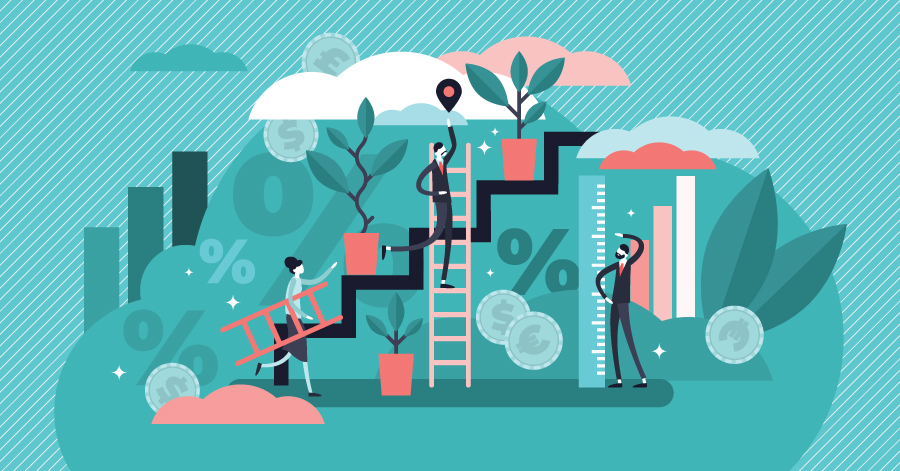Over the past six months, the global Covid-19 pandemic has wreaked havoc on economies, and Greece is no exception. The unprecedented level of disruption inevitably brought us face-to-face with a number of challenges and forced us to step up and make urgent, necessary, hard choices.
Whether this means incorporating top-notch technologies and creating a business friendly environment to attract new investments or strengthening the role of the private sector and shifting to a more export-oriented growth model, we need to move fast.
In this issue of Business Partners, we have asked Thought Leaders from different sectors to focus on their areas of expertise and discuss how we can adopt new successful international business models to see ourselves out of yet another crisis.

Rebuilding Greece in the New Normal on a Foundation of Trust
By Vassilis Kafatos, Deloitte Partner; Vice President, American-Hellenic Chamber of Commerce
After months into the coronavirus pandemic and during an aggressive second wave, we cannot overstate the importance of the moments we currently live in. The choices we make or avoid today and the attitude we maintain in these difficult times will have significant repercussions for the future of our country and our shared prosperity.
Rebuilding Greece after the pandemic will require commitment, courage and conviction, not false certainty about the future or persistence in the old ways of doing things.
courageous decisions need to be made in the midst of uncertainty
One might argue that we are still in survival mode, but as none of us knows what path the Covid-19 crisis will take, we need to change our lens and shift from a today to a tomorrow mindset. As an economy and society, we need to perceive how major Covid-19-related market and societal shifts cause substantial uncertainties that need to be navigated and seized as opportunities to grow and change. Within this context, our business and government leaders must not turn away from uncertainty; they must embrace it by building uncertainty into their policy-making and program design. They need to envision a number of plausible futures for a post Covid-19 world as well as create and employ scenarios, in order to make uncertainty a foundation of decision-making.
The Covid-19 pandemic already functions as a catalyst for major disruptions and changes in technology adoption, ecosystem relationships, market structures, and consumer behavior. For Greece, it should lead to a different economy. A more resilient economy, diversified, extrovert, knowledge-based and digital. An economy built on a new, transformational growth model, that will leverage our country’s assets and strengths, most importantly the highly educated human capital, and will be forged along three main dimensions: an attractive investment environment, a future oriented educational system, and an efficient, digitally transformed government.
Such a new growth model has been a pressing need and an apparent requirement for sustainable economic development at least since the beginning of the economic downturn. What has now changed is the opportunity, the sense of urgency and most importantly, the trust our country has managed to build both prior to the coronavirus outbreak—as markets, investors and institutions gradually showed confidence in the Greek economy—and from deftly navigating through the first—and hopefully the second—wave of the pandemic.
As a country, we should seize the opportunity to energize the Greek society by imagining a successful future and embracing trust as the catalyst to get there; we need to build on the trust created with stakeholders, inside and outside the country, to implement reforms, attract investment and build partnerships and alliances. We need to sustain and take advantage of this momentum and further enhance trust in our community, our capabilities and our future.
This trust can be the foundation upon which courageous decisions need to be made in the midst of uncertainty, with the aim to create a new economic model and leapfrog Greece into the new normal.

Sustainable Banking: Financing the Future we Deserve
By Christos Megalou, CEO, Piraeus Bank
The protracted deep crisis caused by the global pandemic has led to major international initiatives that converge on a broader redefining of the content and priorities of strategies for sustainable development, which remains the crucial issue for all countries.
While the pandemic showed how vulnerable societies and the economy are to environmental degradation, it is particularly encouraging that an international and certainly a European consensus and determination has emerged to lay solid foundations on a global scale for sustainable development that is compatible with environmental protection.
The European Union is at the forefront of this drive. Its goal of becoming the first climate neutral continent by 2050 will require a transformation of the European economy as well as considerable investments to increase funding for the transition to a low carbon economy. At the same time it is clear that coordinated public-private sector efforts are needed to address challenges.
The challenge is to provide comprehensive support to Greek companies to invest in clean technologies
That the EU has set specific longterm goals and mobilized enormous resources, around € 2trillion, demonstrates just how crucial this issue is. Notably, 30% of the above funds are earmarked for investments in green and digital transformation.
For Greece, this transformation is both a challenge and an opportunity, as it will require considerable changes that can establish solid foundations for sustainable development and a modern, productive and competitive economy. Funds exceeding €32 billion have been allocated to Greece and will support this transition.
For Piraeus Bank, the largest bank in Greece, being part of this effort is an obvious strategic goal. We are already active participants in one of the foremost international initiatives for promoting sustainable development: the UNEPFI’s Principles for Responsible Banking (PRB). The PRB call on banks to play a key role, contributing to the implementation of the Paris Agreement and the UN’s Sustainable Development Goals by financing sustainable development. The PRB constitute the first global framework for banks to incorporate sustainable development across all areas of business, from strategy to portfolio management and transactions.
By incorporating the PRB into our operations, Piraeus Bank aims to further boost investments that support productivity and employment in fields that are key to a sustainable future such as digital transformation, agrifood, infrastructure, alternative energy and energy storage, innovation, and biodiversity protection.
To this end, we develop products and services, using Environmental, Social, and Governance (ESG) criteria, to support investment in projects that contribute to mitigating the effects of climate change and have a positive impact on society. The challenge is to provide comprehensive support to Greek companies to invest in clean technologies through specialized financial tools and consulting services. Our role, but also our goal, is to give companies the opportunity to adapt to the new model for sustainable development, which will allow them to increase their competitiveness and access to funding, reduce operating costs and enter new innovative fields.
To effectively implement this strategy, we will make use of existing European programs and funding mechanisms focused on the green economy, as well as the recovery fund. In doing so, Piraeus Bank is in line with global trends that in recent years indicate growing investor interest in using ESG criteria when choosing investments. By attracting ESG investors on the one hand and appropriately channeling capital on the other, we can do our part for achieving dynamic and sustainable economic growth.

Preparing for What’s Next and What Comes Beyond
By Panos Papazoglou, Managing Partner, EY in Greece
The Covid-19 pandemic hit the Greek economy at the dawn of a new phase of rapid recovery and sustainable growth. As the crisis deepens, it is evident that we are now faced with unprecedented economic, social and humanitarian challenges, that will require a novel, imaginative and formidable response.
At a practical level, this response should address three different phases, which we at EY describe as Now, Next and Beyond.
In the immediate term, companies needed to find ways to protect human life, manage remote working, create mechanisms for managing risks, and ensure short-term liquidity. We can reasonably assume that this phase is nearing its completion, unless the second wave of the pandemic proves much lengthier and more severe than the first.
Greek companies must now run a 100-meter sprint after just having completed a marathon
What have we learned during these eight months of the Covid-19 experience? The companies that rose to the challenges most effectively were those that had already made significant steps toward their digital transformation, had established crisis management procedures, and had invested in their human capital. To survive this phase, determination and adaptability were the key requirements.
We have already begun moving to the Next phase, which is really a transitional one, characterized by volatility and great uncertainties. Though companies in different sectors have different priorities, they mainly need to focus on two fronts:
- Adapting their business functions, which involves reducing costs, restoring supply chain and customer service channels, and streamlining corporate structures and portfolios; and
- Strengthening their resilience, based on lessons learned during the crisis. This means achieving a lower cost base, enhancing people flexibility, diversifying the supply chain, focusing on digitization—and, in particular, improving digital customer access—and strengthening cybersecurity.
Greek companies have experienced such transformation and restructuring under pressure during recent years, but this time they will need to proceed at a faster pace to not be outperformed by their global competitors. In short: Greek companies must now run a 100-meter sprint after just having completed a marathon.
The real challenge, however, is what we describe as the Beyond phase, which will require preparation to adapt to a new normal. Disruption and uncertainties caused by different—predictable or unpredictable—forces, are becoming the new normal. We have already witnessed how the pandemic has affected the way we work, travel, communicate, spend, and save. But it has also accelerated several trends that were already in motion and may now have an even greater impact on the future. According to the EY Attractiveness Survey Europe 2020, these include:
- A reconfiguration of supply chains, with a new mix of reshoring, nearshoring and offshoring.
- The acceleration in the adoption of digital technology, with increased emphasis on AI, data analytics, etc.
- A sharper focus on climate change and sustainability.
These trends will have a major impact on the Greek economy and its future role in the global ecosystem. But they can also be drivers of huge opportunities for Greek companies, provided that these companies comprehend the scope of the changes that have been set in motion, respond promptly and effectively, and focus on the long- rather than the near-term. We need to be prepared for tomorrow, as it is only just a day away.

Feeding the Tribe: Catering to Greece’s Health Conscious Consumers
By Dimitra Daskalaki, Organizational Development and Communications Director, METRO AEBE
History tells us that not only is growth possible during a crisis but that fueling growth is the most effective strategy to alleviate the consequences of any crisis. This is an essential mindset to have as we all aspire to reignite growth and restart our countries’ economies.
This growth mindset was adopted and demonstrated by many industries during the pandemic, and the consumer goods industry has clearly been at the forefront. This is important because consumer packaged goods (CPG) are a fundamental engine of the economy. CPG touch billions of people, directly and indirectly, every single day. In Europe alone, CPG account for a market worth approximately $1,300 billion (Nielsen), while in Greece, CPG account for almost 10% of GDP and more than 5% of total employment. The CPG industry has been a bedrock of stability especially in times of crisis and thus has a key role to play in economic recovery.
It is our responsibility and opportunity to not only work towards recovery but also shape the future
Since the beginning of the Covid-19 crisis, leading CPG companies have stepped up as a powerhouse of innovation and value creation, serving consumers with essential products to help them stay safe, healthy and comfortable. They remained agile, responding to changing consumer needs and pressures in the supply chain, and they continued to grow despite the challenging environment. As such, they kept on fueling the local economy.
At P&G we have equally played our role as a leading consumer goods company, globally, regionally and locally. Producing everyday essentials brought us to the forefront during the pandemic. We were fortunate to be able to provide consumers with the products they needed to keep going with their lives, and at the same time we could step up to contribute to the relief efforts of local communities. With a European footprint consisting of 32,000 employees, 32 manufacturing plants, hundreds of retail partners, 35,000 suppliers, and 400 products sold per second, we know that it is our responsibility and opportunity to not only work towards recovery but also shape the future. As we speak, more than 2000 P&G researchers are inventing the products that Europeans will need in a changing world. Our brand and commercial teams are inventing the future of brands and retail, so as to serve consumers in every context and delight them in their homes and in the shops of the future.
As this crisis continues, we can’t lose focus from creating value for our consumers, communities and economies. We should make sure that our products are available where they are needed and that they are the best they can be for those we serve. We will continue to create sustainable and responsible category growth and be a lighthouse for doing business the right way.
This year is going to be another difficult year, but we have to continue to look ahead with confidence and work hard to get through and out of this crisis stronger than before. That’s our job. That’s our responsibility!

How a Hybrid Multicloud Strategy Overcomes the Cloud Paradox
By Spyros Poulidas, CEO, ΙΒΜ Greece and Cyprus, Vice President, Enterprise and Commercial, Portugal, Greece and Cyprus, Israel
Public clouds have a lot to offer. Public clouds bring agility, elasticity and speed, which make a company’s IT department a lot more responsive to the needs of its business. By shifting workloads to the cloud, businesses aspire to make great strides in reducing costs and boosting productivity. This allows them to focus on their core operations and more quickly pivot to new market opportunities.
But, as exciting as public clouds are, businesses that rely on them inevitably run into a paradox: More and more of their data fall hostage to one cloud. Fear of vendor lock-in has quickly become a widespread concern. A study published by Morning Consult shows that 86% of IT decisionmakers say that vendor lock-in by a cloud provider is a key concern in their purchasing decision.
The benefits of hybrid multicloud are freedom and flexibility
Vendor lock-in is about more than just not being able to move to a different vendor. With each cloud choice that a company makes, comes a set of assumptions around everything from the developer tooling to the application capabilities they use. By overrelying on one public cloud, companies can place themselves on a set path and find it difficult to change developers’ habits over time.
A public cloud-only strategy presents other challenges. Companies have unique needs around their data and workloads that public clouds alone cannot satisfy. This is especially true for companies operating in highly regulated industries that need to address specific concerns related to compliance and data protection.
Security is a major concern as well. In fact, security is by far the most important attribute when determining a cloud provider, with nearly 6 in 10 IT decisionmakers ranking it first among tested factors, according to data provided by Morning Consult. This, in part, explains why the vast majority of the world’s workloads remain in private data centers.
The benefits of hybrid multicloud are freedom and flexibility. When it comes to cloud, companies are truly on a journey. They need help crafting strategies that are unique to the environment they live in, the challenges they face, and the opportunities that will determine their future.
The world is chaotic and uncertain. Competition, market forces, tougher regulations, geopolitics, constant shifts in consumer demands and expectations—all of these reasons, among many others, mean that companies need to overcome the cloud paradox so they can be free to make critical decisions about the future of their IT infrastructure.
What businesses need, now more than ever, is the freedom to securely deploy, run and manage their data and apps on the cloud of their choice—without running the risk of being locked in.
This is exactly the value that a hybrid multicloud approach brings to large businesses. It gives them the freedom and flexibility to host their own software one day, move that same setup to a cloud provider the next, and still have the freedom to change cloud providers down the road.
A hybrid multicloud approach also brings all of the benefits of a public cloud to other parts of a company’s IT environment. It allows companies to gain visibility and control over their entire infrastructure and, in turn, do business and bring their innovations out into the world in a much more secure and efficient manner.

A Future for Tourism
By Yiannis Tsakalos, CEO, AQ Strategy
The worldwide lockdown that we are experiencing is something that nobody could have imagined. In the past 20 years, major events such as 9/11 and the MERS, SARS and swine flu outbreaks altered tourism on a global level, yet the Covid-19 pandemic is unlike anything we have experienced so far. In this very difficult conjuncture, ruled by fear and lack of security, it is our duty to carefully study these developments, understand the situation, adapt, and levelheadedly draft an action plan for the future. We have to see this problem as an opportunity, to prioritize we over me, and to invest in tourism in new ways.
This is the right time to look at the future with fresh eyes and create a new narrative based on human values, experiences and sustainable development
In the past, tourism has shown resilience, and I believe that we can expect it to do the same in the present. Certainly, we will need time to recoup from this crisis. According to the World Tourism Organization’s latest estimates, the return to a (new) normality is based on three parameters: first, on restoring the traveler’s psychology and confidence to travel again (sense of security and evolution or not of the pandemic); second, the gradual reduction in travel restrictions; and third, the prevailing economic conditions (current and future).
The first two will gradually return, but the deterioration of the economic climate may delay the return to previous numbers. The general estimation is that in 2021, tourism in Greece will face a reduction in arrivals of 50% in comparison to 2019. Recuperation is expected in 2022 (around 75% occupancy in comparison to 2019), but everything rests on whether or not an effective vaccine will have been developed, as well as the respective medicine, so that this problem can be faced head-on.
The only certainty is that the new normal will be different in every possible way. The modern need for new experiences that offer emotional growth will multiply after self-isolation. This takes on another dimension, and because this need has been suppressed due to Covid-19, I predict that there will be a strong recovery from 2023 onwards. In this context, I consider three things to be vital for the next day of tourism: adaptability, sustainability and, of course, a digital transformation in preparation for this new era.
The generations that will be our future visitors will be in the majority millennials and generation Z, generations born into technology, who want to travel the globe and gather unique experiences. They are longing for the planet; society and the environment will be at the center of their thinking.
This is the right time to look at the future with fresh eyes and create a new narrative based on human values, experiences and sustainable development. Beyond the sun and the sea, the new narrative must highlight Greek gastronomy and wine, the country’s unique products, the culture, the young people, the modern art, the new Greece as a whole. Every place in this country is unique and has a fascinating story to tell. Every day, every season, all year. Greece is an open country, with open people, with an open heart, who know how to welcome travelers from all over the world all year round and offer them unique experiences. This will set us apart and give us the competitive advantage that will take us safely the next day.






